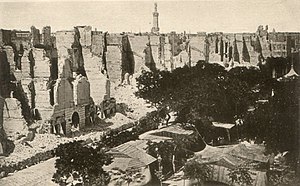
Back قصف الإسكندرية Arabic مالتیز اوْلایی AZB Aleksandrian pommitus Finnish Bombardement d'Alexandrie French Bombardamento di Alessandria Italian アレクサンドリア砲撃 Japanese Bombardowanie Aleksandrii (1882) Polish Bombardeamento de Alexandria (1882) Portuguese Бомбардировка Александрии Russian Maltız Olayı Turkish
| Bombardment of Alexandria | |||||||
|---|---|---|---|---|---|---|---|
| Part of the Anglo-Egyptian War | |||||||
 Alexandria in ruins after the bombardment | |||||||
| |||||||
| Belligerents | |||||||
|
|
| ||||||
| Commanders and leaders | |||||||
|
|
| ||||||
| Strength | |||||||
|
British: 9 battleships 1 torpedo boat 1 steamer 5 gunboats | 11 forts | ||||||
| Casualties and losses | |||||||
|
6 killed 27 wounded[1] |
100-150 killed, 250-350 wounded (Egyptian Army official figures)[2] 600–700 killed (British and American estimates)[2][3] | ||||||
|
Unknown number of civilians killed Large sections of Alexandria destroyed in bombardment and subsequent fires | |||||||
The Bombardment of Alexandria in Egypt by the British Mediterranean Fleet took place on 11–13 July 1882.
Admiral Beauchamp Seymour was in command of a fleet of fifteen Royal Navy ironclad ships which had previously sailed to the harbor of Alexandria to support the khedive Tewfik Pasha amid Ahmed 'Urabi's nationalist uprising against his administration and its close ties to British and French financiers. He was joined in the show of force by a French flotilla as well. The move provided some security to the khedive, who withdrew his court to the now-protected port, but strengthened 'Urabi's nationalists within the army and throughout the remainder of Egypt. On 11 June, anti-European riots began in Alexandria. The city's European residents fled and the Egyptian 'Urabist army began fortifying and arming the harbour. An ultimatum to cease this build-up being refused, the British fleet began a 10½-hour bombardment of the city without French assistance. Historians argue about whether Admiral Seymour exaggerated the threat from the Egyptian batteries at Alexandria in order to force the hand of a reluctant Gladstone administration. Once the British had attacked the city, they then proceeded to a full-scale invasion to restore the authority of the khedive. Egypt remained under British influence until 1952, with the last British troops leaving in 1956.
© MMXXIII Rich X Search. We shall prevail. All rights reserved. Rich X Search